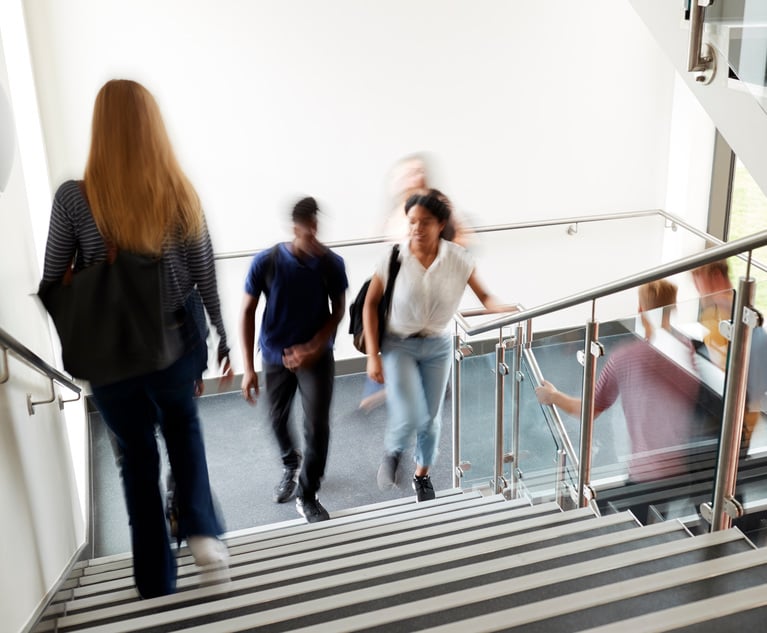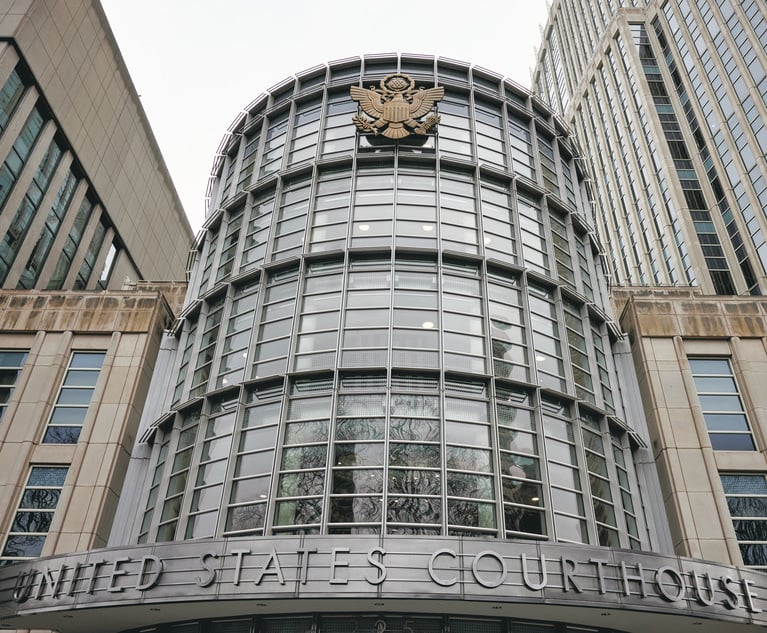Hear Ye, Hear Ye! First Amendment Clinics Trending at Law Schools
When the Cornell clinic launched, Bruce Brown, the executive director of the Reporters Committee for Freedom of the Press, said it was needed to counter the Trump administration's attacks on the press and help state and local journalists who don't have access to lawyers.
September 24, 2019 at 01:59 PM
5 minute read
The original version of this story was published on Law.com
 Photo: zimmytws/Shutterstock
Photo: zimmytws/Shutterstock
Hot off the presses: The First Amendment is having a moment on law campuses.
Washington University in St. Louis School of Law launched a new First Amendment clinic this semester, while both the University of Georgia School of Law and Tulane University Law School this month unveiled plans to follow suit.
First Amendment clinics have proliferated over the past three years, with programs coming on line at Cornell Law School; Duke Law School; Vanderbilt Law School; and Arizona State University Sandra Day O'Connor College of Law. The Antonin Scalia Law School at George Mason University in 2018 launched a free speech clinic. And the University of Virginia School of Law this fall brought back its First Amendment Clinic this semester after a three-year hiatus.
Those new programs join more established First Amendment and press freedom clinics at Yale Law School; the University of California, Los Angeles School of Law; and Michigan State University College of Law, among others.
It's not necessarily politics fueling the growing interest in the First Amendment, noted Eugene Volokh, who has headed up UCLA's First Amendment Amicus Brief Clinic since 2013. Legal academics have always been interested in free speech issues, but the increasing emphasis on hands-on learning and an influx of outside funding for such clinics have converged to create more opportunities than ever before, he said.
"I don't think that people are more interested in the First Amendment now because of the Trump administration," Volokh said. "I think throughout the last 25 years that I've been teaching, it has been understood that First Amendment issues are important at a certain level, manageable in many ways by students, and appealing and interesting to students. I don't think that has materially changed."
Clinics aren't the only way that law schools are taking on free speech issues. Earlier this month, Yale Law School's Media Freedom and Information Access Clinic and the Reporters Committee for Freedom of the Press unveiled the Free Expression Legal Network. It's a coalition of 22 law school clinics that have pledged to provide pro bono assistance to journalists and documentary filmmakers. Also involved are roughly two dozen law school faculty across the country with free speech expertise.
"Reporters today face many obstacles in covering public officials and public issues, just as they are confronted with a dramatic resources crunch," said Reporters Committee Director Bruce Brown in an announcement of the network. "Law school clinics, academics, nonprofits and funders are stepping up to meet this growing need for pro bono legal services."
A major factor in the recent proliferation of First Amendment clinics is the Stanton Foundation, which was created by former CBS News president Frank Stanton with the purpose of advancing the First Amendment. Stanton led the television network from 1946 to 1971 and died in 2006. (He organized the first televised debate in 1960, between John F. Kennedy and Richard Nixon.)
Arizona State established its clinic in 2018 with nearly $1 million in funding from the Stanton Foundation. Washington University also received a grant from the foundation for its clinic. The foundation's nearly $1 million grant to Tulane will cover the operating costs for its planned clinic for five years. And the University of Georgia has received $900,000 from the Stanton Foundation to get its new clinic up and running.
"The law school community is excited about this partnership, which will not only support the First Amendment, but also give our law students the chance to protect the rights of individuals and to raise civic awareness in communities throughout the Southeast as they learn how to navigate cases and assist clients so they will be effective lawyers after graduation," said Dean Peter "Bo" Rutledge in an announcement of the clinic this week.
The types of cases these clinics handle run the gamut. George Mason's free speech clinic this spring challenged California restrictions on personalized license plates. Arizona State's First Amendment Clinic this summer helped a journalist access sealed court documents pertaining to the investigation into a humanitarian aid worker facing 20 years in prison for allegedly helping migrants cross the border. And Duke's First Amendment Clinic this spring filed an amicus brief asking the U.S. Supreme Court to hear a case involving free speech activists at the University of South Carolina who were punished for holding signs with racially derogatory terms at a campus demonstration.
First Amendment clinics are conducive to teaching for a number of reasons, including the fact that the stakes are lower than, say, handling death penalty cases, Volokh said.
"It's appealing to students," he said. "There is a steady flow of these cases. There are always going to be some kind of access to court records cases, or other local free speech disputes. A lot of poor defendants in injunction cases—and civil cases that involve free speech or libel cases—need help. What's more, in many respects there is an institutional infrastructure of media and media lawyers that can refer cases if they are looking for amicus briefs and the like. It's easy for teaching purposes."
Read More:
Retired Dow Jones GC Returns to Cornell to Train 1st Amendment Lawyers
s
This content has been archived. It is available through our partners, LexisNexis® and Bloomberg Law.
To view this content, please continue to their sites.
Not a Lexis Subscriber?
Subscribe Now
Not a Bloomberg Law Subscriber?
Subscribe Now
NOT FOR REPRINT
© 2025 ALM Global, LLC, All Rights Reserved. Request academic re-use from www.copyright.com. All other uses, submit a request to [email protected]. For more information visit Asset & Logo Licensing.
You Might Like
View All
The Met Hires GC of Elite University as Next Legal Chief

NY Appellate Panel Cites Student's Disciplinary History While Sending Negligence Claim Against School District to Trial

'No Evidence'?: Big Law Firms Defend Academic Publishers in EDNY Antitrust Case
3 minute read
'Substantive Deficiencies': Judge Grants Big Law Motion Dismissing Ivy League Price-Fixing Claims
3 minute readTrending Stories
- 1'Shame on Us': Lawyer Hits Hard After Judge's Suicide
- 2Upholding the Integrity of the Rule of Law Amid Trump 2.0
- 3Connecticut Movers: New Laterals, Expanding Teams
- 4Eliminating Judicial Exceptions: The Promise of the Patent Eligibility Restoration Act
- 5AI in Legal: Disruptive Potential and Practical Realities
Who Got The Work
J. Brugh Lower of Gibbons has entered an appearance for industrial equipment supplier Devco Corporation in a pending trademark infringement lawsuit. The suit, accusing the defendant of selling knock-off Graco products, was filed Dec. 18 in New Jersey District Court by Rivkin Radler on behalf of Graco Inc. and Graco Minnesota. The case, assigned to U.S. District Judge Zahid N. Quraishi, is 3:24-cv-11294, Graco Inc. et al v. Devco Corporation.
Who Got The Work
Rebecca Maller-Stein and Kent A. Yalowitz of Arnold & Porter Kaye Scholer have entered their appearances for Hanaco Venture Capital and its executives, Lior Prosor and David Frankel, in a pending securities lawsuit. The action, filed on Dec. 24 in New York Southern District Court by Zell, Aron & Co. on behalf of Goldeneye Advisors, accuses the defendants of negligently and fraudulently managing the plaintiff's $1 million investment. The case, assigned to U.S. District Judge Vernon S. Broderick, is 1:24-cv-09918, Goldeneye Advisors, LLC v. Hanaco Venture Capital, Ltd. et al.
Who Got The Work
Attorneys from A&O Shearman has stepped in as defense counsel for Toronto-Dominion Bank and other defendants in a pending securities class action. The suit, filed Dec. 11 in New York Southern District Court by Bleichmar Fonti & Auld, accuses the defendants of concealing the bank's 'pervasive' deficiencies in regards to its compliance with the Bank Secrecy Act and the quality of its anti-money laundering controls. The case, assigned to U.S. District Judge Arun Subramanian, is 1:24-cv-09445, Gonzalez v. The Toronto-Dominion Bank et al.
Who Got The Work
Crown Castle International, a Pennsylvania company providing shared communications infrastructure, has turned to Luke D. Wolf of Gordon Rees Scully Mansukhani to fend off a pending breach-of-contract lawsuit. The court action, filed Nov. 25 in Michigan Eastern District Court by Hooper Hathaway PC on behalf of The Town Residences LLC, accuses Crown Castle of failing to transfer approximately $30,000 in utility payments from T-Mobile in breach of a roof-top lease and assignment agreement. The case, assigned to U.S. District Judge Susan K. Declercq, is 2:24-cv-13131, The Town Residences LLC v. T-Mobile US, Inc. et al.
Who Got The Work
Wilfred P. Coronato and Daniel M. Schwartz of McCarter & English have stepped in as defense counsel to Electrolux Home Products Inc. in a pending product liability lawsuit. The court action, filed Nov. 26 in New York Eastern District Court by Poulos Lopiccolo PC and Nagel Rice LLP on behalf of David Stern, alleges that the defendant's refrigerators’ drawers and shelving repeatedly break and fall apart within months after purchase. The case, assigned to U.S. District Judge Joan M. Azrack, is 2:24-cv-08204, Stern v. Electrolux Home Products, Inc.
Featured Firms
Law Offices of Gary Martin Hays & Associates, P.C.
(470) 294-1674
Law Offices of Mark E. Salomone
(857) 444-6468
Smith & Hassler
(713) 739-1250






